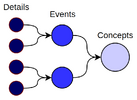I've been thinking about this from time to time, and I'm curious about what you guys think about this.
The thing is, as I've been rereading some books, sometimes for the 3rd, 4th, 5th time (e.g., Political Ponerology, Wave, ISOTM), I've been a bit disappointed to notice that many pages appear "completely new" to me, as if I'd never read them. At times, it has made me wonder what's the point of reading all these non-fiction books if I can't remember what is said in them? On the plus side, I do remember the main gist of the books I've read, and I'd probably know where to look up certain details if needed. And, rereading often clarifies passages further. Still, I'd like to remember more.
I take some comfort in suspecting that even if I can't remember specific details in a book after a while, the reading has still produced some new "synaptic connections" in my brain and, thus, increased my awareness and understanding. Building a 'magnetic center' and all that. Wishful thinking?
Some of you, like Laura, have a photographic memory which enables you to remember almost everything you've read. I sometimes wish I'd had that ability!
What are your views and experiences regarding this?
The thing is, as I've been rereading some books, sometimes for the 3rd, 4th, 5th time (e.g., Political Ponerology, Wave, ISOTM), I've been a bit disappointed to notice that many pages appear "completely new" to me, as if I'd never read them. At times, it has made me wonder what's the point of reading all these non-fiction books if I can't remember what is said in them? On the plus side, I do remember the main gist of the books I've read, and I'd probably know where to look up certain details if needed. And, rereading often clarifies passages further. Still, I'd like to remember more.
I take some comfort in suspecting that even if I can't remember specific details in a book after a while, the reading has still produced some new "synaptic connections" in my brain and, thus, increased my awareness and understanding. Building a 'magnetic center' and all that. Wishful thinking?
Some of you, like Laura, have a photographic memory which enables you to remember almost everything you've read. I sometimes wish I'd had that ability!

What are your views and experiences regarding this?

 ) is said to put plenty of meaning in just a few words. Laura is sometimes the opposites. She writes the same thing 10 times in 10 different ways so hopefully most people would get what she tries to convey.
) is said to put plenty of meaning in just a few words. Laura is sometimes the opposites. She writes the same thing 10 times in 10 different ways so hopefully most people would get what she tries to convey.

